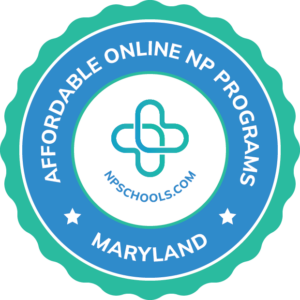Maryland Online NP Programs
Find NP Schools
For the latest academic year, we have over 180 NP schools in our database and those that advertise with us are labeled “sponsor”. When you click on a sponsoring school or program, or fill out a form to request information from a sponsoring school, we may earn a commission. View our advertising disclosure for more details.
“What I wish more people understood is that NPs are highly educated, board-certified providers who bring a holistic and collaborative approach to healthcare.”
Ronnie Quattrini, DNP, Associate Professor, University of Maryland School of Nursing
Maryland stands out as a leader in nurse practitioner (NP) autonomy, having enacted full practice authority in 2015. This legislative advancement allows NPs to independently evaluate patients, diagnose conditions, interpret diagnostic tests, and initiate treatments, including prescribing medications, without physician oversight. Such autonomy is particularly impactful in Maryland’s diverse healthcare landscape, where NPs play a crucial role in addressing primary care shortages, especially in rural and underserved areas. To support this, Maryland offers a range of online NP programs that provide flexible, high-quality education, enabling registered nurses to advance their careers while continuing to serve their communities.
The demand for nurse practitioners in Maryland is experiencing significant growth. According to data from CareerOneStop.org (2025), the state employed approximately 5,240 NPs in 2022, with projections estimating an increase to 7,450 by 2032, a 42 percent growth over the decade. This upward trend highlights the crucial role of NPs in addressing healthcare gaps and meeting the evolving needs of Maryland’s population.
Online NP programs play a crucial role in preparing a robust workforce of nurse practitioners who are ready to deliver comprehensive, accessible, and high-quality care throughout the state.
Meet the Expert: Veronica “Ronnie” Quattrini, DNP, MS, FNP-BC, FAANP

Dr. Ronnie Quattrini is an associate professor and senior director of the doctor of nursing practice (DNP) program in the Department of Family and Community Health at the University of Maryland School of Nursing. A certified FNP with clinical expertise in emergency and urgent care, she brings decades of practice and teaching experience to advanced practice nursing education.
Dr. Quattrini’s academic leadership includes directing core courses in advanced health assessment, diagnosis, and practice leadership for DNP and NP students. Her scholarship focuses on interprofessional education, emergency medicine, simulation-based learning, and improving communication across healthcare teams. Her research has been supported by organizations such as the Robert Wood Johnson Foundation, the Maryland Higher Education Commission, and the University of Maryland, Baltimore.
Dr. Quattrini earned her DNP from Thomas Jefferson University, her MS from the University of Maryland School of Nursing, her BSN from UMBC, and her nursing diploma from St. Joseph’s Nursing School. She is committed to advancing patient-centered care and critical thinking through simulation and collaborative education.
NPSchools.com: What’s something you wish people knew about NP practice in Maryland?
Dr. Quattrini: Nurse practitioners in Maryland are licensed for full practice authority, which means we are authorized to independently assess, diagnose, treat, and prescribe medications across all settings. This level of autonomy enables us to significantly improve access to high-quality, patient-centered care, particularly in underserved and rural communities where provider shortages persist.
What I wish more people understood is that NPs are highly educated, board-certified providers who bring a holistic and collaborative approach to healthcare. Many of us also hold a DNP degree, which equips us with additional expertise in systems leadership, evidence-based practice, and quality improvement. This added preparation enhances our ability to deliver care that is not only clinically sound but also aligned with broader organizational and public health goals.
NPSchools.com: Do you have any advice for aspiring NPs?
Dr. Quattrini: For those aspiring to become NPs, and especially those pursuing the DNP, my advice is to embrace the full scope of what the role—and the degree—can offer. The DNP is not just about achieving a terminal degree; it’s about stepping into a leadership role in clinical practice, health systems, and beyond.
DNP-prepared NPs are uniquely equipped to bridge the gap between evidence and practice. Whether through leading quality improvement initiatives, implementing systems-level change, or influencing health policy, the DNP provides the tools to think critically, lead confidently, and improve outcomes on a broad scale.
Approach your education with curiosity and intentionality. Use your scholarly work, clinical experiences, and leadership training to shape the kind of provider and change agent you want to become. And remember: the value of the DNP lies not just in what you know, but in how you use that knowledge to elevate practice, advance equity, and serve your patients and communities
NPSchools.com: What does the future of NP practice in Maryland look like to you?
Dr. Quattrini: The future of NP practice in Maryland is incredibly promising and one of continued growth, innovation, and leadership. As our healthcare system evolves, NPs will play an increasingly vital role in delivering accessible, high-quality care across a variety of settings—from primary care and specialty clinics to acute care and community health.
I anticipate greater representation of NPs in leadership roles, policymaking, and interdisciplinary research. With full practice authority and a strong foundation of clinical autonomy, Nurse Practitioners are already playing a central role in delivering accessible, high-quality care across the state.
A key reason we’ve reached this point is the persistent and effective advocacy of the Nurse Practitioner Association of Maryland (NPAM). NPAM has been instrumental in advancing the profession, championing legislative efforts, educating stakeholders, and ensuring that the voices of NPs are heard at every level of decision-making. Their work has helped solidify Maryland as a leader in progressive NP practice.
Looking ahead, I see DNP-prepared NPs further shaping that future—leading interdisciplinary teams, driving evidence-based innovation, and influencing health policy to improve outcomes and equity. With continued support from organizations like NPAM, Maryland is well-positioned to remain a national model for how to fully leverage the contributions of Nurse Practitioners in transforming healthcare.

Most Affordable Online NP Programs in Maryland (Ranked by In-State Tuition)
| School | Degrees | Specializations | Programs & Tuition | Programs | Tuition (in-state) |
||||||||||||||||||||||||||||||||||
|---|---|---|---|---|---|---|---|---|---|---|---|---|---|---|---|---|---|---|---|---|---|---|---|---|---|---|---|---|---|---|---|---|---|---|---|---|---|---|---|
| Johns Hopkins School of Nursing |
|
|
|
|
|||||||||||||||||||||||||||||||||||
NP Practice Authority in Maryland
How Much Do Nurse Practitioners Make in Maryland?
| United States | Maryland | |
| Number of NPs Employed | 307,390 | 6,640 |
| Average Salary | $132,000 | $127,100 |
| 10th Percentile | $97,960 | $92,860 |
| 25th Percentile | $109,940 | $111,190 |
| 50th Percentile (Median) | $129,210 | $125,530 |
| 75th Percentile | $149,570 | $141,840 |
| 90th Percentile | $169,950 | $167,260 |
| Source: BLS May (2024)—the latest data available as of January 2026 | ||
Nearby States with Affordable Online NP Programs

Kimmy Gustafson
WriterAmong her many diverse writing endeavors, Kimmy Gustafson has also lent her expertise to NPSchools.com since 2020, providing insightful and engaging content about the significant role of education in shaping our future generations of nurse practitioners. Many of her pieces include interviewing experts on timely topics such as healthcare workplace violence and moral distress.
Kimmy has been a freelance writer for more than a decade, writing hundreds of articles on a wide variety of topics such as startups, nonprofits, healthcare, kiteboarding, the outdoors, and higher education. She is passionate about seeing the world and has traveled to over 27 countries. She holds a bachelor’s degree in journalism from the University of Oregon. When not working, she can be found outdoors, parenting, kiteboarding, or cooking.

Matt Zbrog
WriterMatt Zbrog is a writer and researcher from Southern California, and he believes nurse practitioners (NP) are an indispensable component of America’s current and future healthcare workforce. Since 2018, he’s written extensively about the work and advocacy of NPs, with a particular focus on the rapid growth of specialization programs, residencies, fellowships, and professional organizations. As part of an ongoing series on state practice authority, he’s worked with NP leaders, educators, and advocates from across the country to elevate policy discussions that empower NPs. His articles have featured interviews with the leadership of the American Association of Nurse Practitioners (AANP), the National Association of Pediatric Nurse Practitioners (NAPNAP), and many other professional nursing associations.